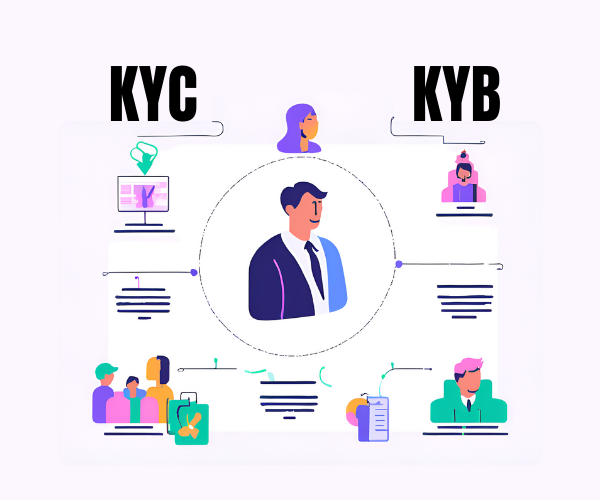In today's global economy, financial crimes such as money laundering and fraud pose significant risks to businesses. To combat these threats, regulations like Know Your Customer (KYC), Know Your Business (KYB), and Anti-Money Laundering (AML) have become essential compliance measures. Understanding these concepts and their importance is crucial for businesses aiming to maintain integrity and trust in their operations.
Understanding KYC, KYB, and AML
What is KYC (Know Your Customer)?
 KYC is a regulatory process that financial institutions and businesses use to verify the identity of their customers. It involves gathering personal information such as name, date of birth, and address, and then verifying its accuracy, often through identity documents and proof of address. Some countries now use non-document methods, extracting and verifying data from government databases instead.
KYC is a regulatory process that financial institutions and businesses use to verify the identity of their customers. It involves gathering personal information such as name, date of birth, and address, and then verifying its accuracy, often through identity documents and proof of address. Some countries now use non-document methods, extracting and verifying data from government databases instead.Why is KYC important?
- Prevents identity theft and fraud: By verifying customer identities, businesses can reduce the risk of fraudulent activities.
- Enhances security in financial transactions: Accurate customer information ensures that transactions are legitimate and secure.
- Ensures regulatory compliance: Adhering to KYC procedures helps businesses comply with legal requirements, avoiding potential fines and legal issues.
What is KYB (Know Your Business)?
KYB extends the principles of KYC to corporate entities. It requires businesses to verify the legitimacy of their partners, suppliers, and clients by collecting information about company ownership, financial history, and business activities. This process often involves screening companies and their beneficiaries against sanctions lists, global watchlists, Politically Exposed Persons (PEPs) lists, adverse media, and other similar sources.Why is KYB important?
- Prevents partnerships with fraudulent or high-risk entities: Verifying business partners ensures that companies engage only with legitimate entities.
- Ensures transparency in business transactions: Understanding the ownership and operations of partner businesses promotes trust and transparency.
- Helps comply with anti-money laundering regulations: KYB processes are integral to a company's overall AML strategy, aiding in the detection and prevention of illicit activities.
What is AML (Anti-Money Laundering)?
 AML refers to a set of regulations and procedures designed to detect and prevent money laundering activities. Financial institutions must monitor transactions for suspicious activities and report them to regulatory authorities. This includes implementing robust transaction monitoring systems to identify and prevent fraudulent transactions.
AML refers to a set of regulations and procedures designed to detect and prevent money laundering activities. Financial institutions must monitor transactions for suspicious activities and report them to regulatory authorities. This includes implementing robust transaction monitoring systems to identify and prevent fraudulent transactions.
Why is AML important?
- Protects businesses from being exploited for illegal financial activities: Effective AML measures prevent companies from inadvertently facilitating money laundering.
- Helps governments combat financial crimes and terrorism financing: AML compliance supports broader efforts to maintain national and global security.
- Strengthens the integrity of the global financial system: By adhering to AML regulations, businesses contribute to a more transparent and trustworthy financial environment.
The Role of Comprehensive Verification Solutions
Implementing effective KYC, KYB, and AML processes can be complex and resource-intensive. However, comprehensive verification platforms likeSumsub offer full-cycle solutions that streamline these compliance procedures. Sumsub provides customizable KYC/AML solutions designed to help businesses stay compliant worldwide, boasting over 90% pass rates across more than 220 countries and territories.By utilizing such platforms, businesses can:- Accelerate customer and partner onboarding: Automated verification processes reduce the time required to validate identities and business legitimacy.
- Enhance fraud detection and prevention: Advanced technologies monitor transactions and flag suspicious activities in real-time.
- Ensure compliance with evolving regulations: Regular updates to verification protocols help businesses adhere to the latest legal requirements.
Conclusion
KYC, KYB, and AML are fundamental components of a robust compliance framework, essential for maintaining trust and security in the financial ecosystem. As regulations evolve and financial crimes become more sophisticated, businesses must adopt advanced compliance strategies. Leveraging comprehensive verification solutions like Sumsub can help companies navigate these challenges effectively, ensuring compliance and fostering a secure business environment.Want to learn more?
Want to learn how advanced verification solutions can enhance your compliance processes? Contact us and we will help you!
